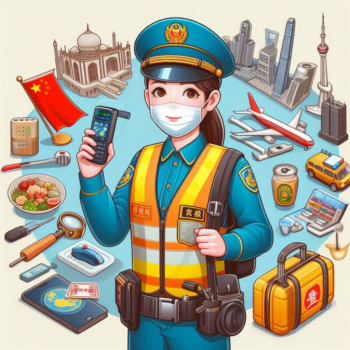
China is a fascinating country with a rich cultural heritage and a rapidly modernizing society.
While it is generally considered safe for foreigners, it’s always wise to be aware of potential risks and take precautions to ensure your safety.
This guide provides practical, detailed tips to help you navigate life or travel in China safely and confidently.
1. Understanding Local Laws and Regulations
China has strict laws and regulations that may differ significantly from those in your home country.

Violating these laws, even unintentionally, can lead to serious consequences.
- Drug Laws: Drug offenses are severely punished in China, with penalties ranging from long prison sentences to the death penalty. Even small amounts of illegal substances can result in harsh consequences. Learn more about China’s drug laws here.
- ID Requirements: Always carry a copy of your passport and visa. Police may conduct random checks, especially in major cities. Failure to provide identification can result in fines or detention.
- Public Behavior: Avoid public disturbances, as these can lead to fines or legal trouble. For example, loud arguments or public protests are not tolerated.
Tip: Familiarize yourself with local laws by consulting your embassy’s website or resources like China Law Translate.
2. Staying Safe in Traffic
Traffic in China can be chaotic, especially in major cities like Beijing, Shanghai, and Guangzhou.
Pedestrians do not always have the right of way, and traffic signals are not always adhered to.
- Crossing Streets: Use pedestrian crossings and overpasses whenever possible. Even at crosswalks, remain vigilant, as vehicles may not stop.
- Public Transportation: Buses, subways, and trains are generally safe and reliable. Apps like DiDi (China’s version of Uber) are convenient for getting around but ensure you use the official app to avoid scams.
- Cycling: If you plan to cycle, wear a helmet and stick to designated bike lanes. Bike-sharing apps like Meituan Bike are popular but require caution in busy areas.
3. Avoiding Scams and Tourist Traps
Tourist areas can be hotspots for scams.
Being aware of common tactics can save you time, money, and frustration.
- Fake Taxis: Always use official taxis or ride-hailing apps like DiDi. Fake taxis often overcharge or take longer routes.
- Tea House Scams: In cities like Beijing and Shanghai, scammers may invite you to a tea house, only to present you with an exorbitant bill. Politely decline unsolicited invitations.
- Overpriced Souvenirs: When shopping in tourist areas, compare prices and avoid buying from street vendors unless you’re confident in the value.
Tip: Check reviews on platforms like TripAdvisor or Mafengwo before booking tours or visiting attractions.
4. Protecting Your Belongings
While violent crime is rare in China, petty theft can occur, especially in crowded areas like markets, train stations, and tourist attractions.
- Anti-Theft Bags: Use anti-theft backpacks or crossbody bags with hidden zippers.
- Hotels: Store important documents and valuables in the hotel safe. Avoid leaving items like passports or electronics unattended in your room.
- Public Spaces: Be mindful of pickpockets in crowded areas. Keep your phone and wallet in front-facing pockets.
Tip: Consider using a money belt or RFID-blocking wallet to protect against theft and electronic pickpocketing.
5. Health and Medical Safety
Healthcare in China varies widely between urban and rural areas.
While major cities have international hospitals with English-speaking staff, smaller towns may lack adequate facilities.
- Health Insurance: Ensure you have comprehensive health insurance that covers medical evacuation if necessary. World Nomads and Allianz Travel Insurance are popular options for expats and travelers.
- Food and Water Safety: Stick to bottled water, as tap water is not safe to drink. Be cautious with street food and ensure it’s freshly cooked.
- Emergency Numbers: Dial 120 for medical emergencies. Save the contact information for the nearest international hospital.
Tip: Download the Ping An Good Doctor app for online medical consultations in English.
6. Emergency Contacts and Communication
Having a list of emergency contacts can be a lifesaver in critical situations.
- Key Contacts: Save the numbers for local police (110), fire services (119), and medical emergencies (120). Also, keep the contact information for your country’s embassy or consulate.
- Language Barriers: Learn basic Mandarin phrases like “Help!” (救命, jiù mìng) or “I need a doctor” (我需要医生, wǒ xū yào yī shēng). Apps like Google Translate or Pleco can assist with communication.
- WeChat: This app is essential for communication, navigation, and even payments in China. Download WeChat here.
7. Cultural Sensitivity and Respect
Understanding and respecting local customs can help you avoid misunderstandings and build positive relationships.
- Etiquette: Remove your shoes before entering someone’s home. Avoid pointing with your finger, as it can be considered rude.
- Sensitive Topics: Avoid discussing politics, religion, or other sensitive issues. These topics can lead to uncomfortable or even dangerous situations.
- Gift-Giving: If invited to someone’s home, bring a small gift, such as fruit or tea, as a token of appreciation.
Tip: Read more about Chinese etiquette on China Highlights.
8. Using Technology Wisely
China has a robust digital infrastructure, but internet access is heavily regulated.
- Secure Passwords: Use strong, unique passwords for your accounts and enable two-factor authentication.
- Apps: Download essential apps like WeChat, Alipay, and Baidu Maps for navigation and payments.
9. Staying Informed
Staying updated on local news and travel advisories can help you avoid potential risks.
- News Sources: Follow local news outlets like China Daily or international sources like BBC.
- Expat Communities: Join forums like Internations or WeChat groups to connect with other expats and share advice.
10. Emergency Preparedness
Natural disasters, though rare, can occur in China.
Being prepared can make all the difference.
- Earthquakes: Familiarize yourself with earthquake safety procedures, especially if you’re in regions like Sichuan.
- Typhoons: Coastal areas like Guangdong and Fujian are prone to typhoons. Monitor weather updates on apps like AccuWeather.
- Emergency Kit: Keep a basic emergency kit with water, non-perishable food, a flashlight, and a first-aid kit.
Conclusion
Living or traveling in China can be a rewarding experience, but staying informed and prepared is key to ensuring your safety.
By understanding local laws, respecting cultural norms, and taking practical precautions, you can enjoy all that China has to offer with peace of mind.
For more resources, visit:
Stay safe and enjoy your journey in China!


